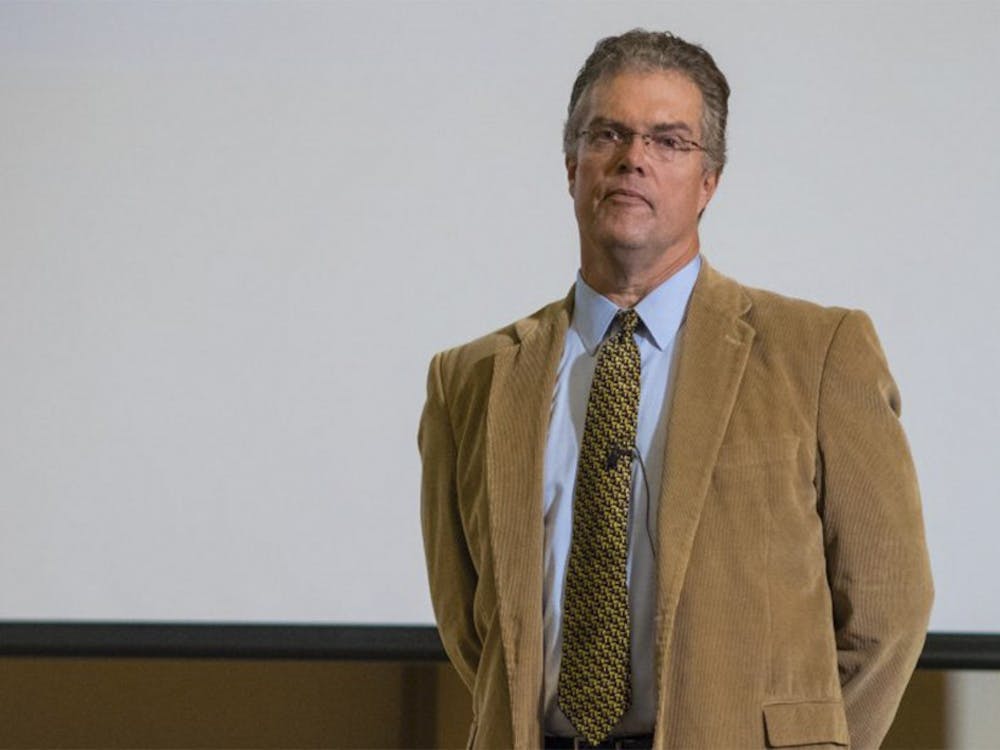After an unsuccessful gubernatorial run in 2008, Duke professor Michael Munger is diving back into politics.
Munger, who is listed as a Libertarian candidate running for the North Carolina House of Representatives, also ran for governor as a Libertarian in 2008. At Duke, he is the director of undergraduate studies and professor of political science, and he directs the philosophy, politics and economics certificate program.
He received 2.85% of the vote during his 2008 race, totaling 121,585 votes. During the campaign, he became the first third-party gubernatorial candidate in the state to appear on a televised debate.
His district’s lines were recently changed, with redistricting procedures moving him from N.C. House District 40 to 34. This new district includes a large part of Raleigh and North Carolina State University.
A Raleigh native, Munger feels “much more qualified to represent” his new district. He told The Chronicle that this change was what encouraged him to start his new campaign.
“It has a fair number of college students and people that work at the college,” he said. “It’s a bigger cross-section and a more urban place.”
Munger acknowledged that a role serving in the N.C. House is “something that [he] could actually manage well while also being a Duke professor.”
The first issue on which Munger is centering his campaign is school choice for those from lower socioeconomic backgrounds.
“A lot of school choice programs have only kind of served the wealthy,” Munger said. “I think that having charter schools that have more resources or a voucher program for the poorest 40% of North Carolina citizens would help that a bit.”
Additionally, he wants to focus on “dismantling and reforming” the Alcoholic Beverage Control System because he believes North Carolina has “one of the most restrictive state-operated liquor operations in the United States.”
“Many of [the commissioners] have 20 people who work for them, so we’ve got this enormous bureaucracy with hundreds and hundreds of people when there already is a set of grocery stores or could-be private liquor stores that would operate alongside,” Munger said.
Ultimately, he hopes to combine these two ideas.
His goal is to impose a tax on the privately provided alcohol system that would keep alcohol prices similar to their previous level. He would then use the alcohol tax revenue to fund his goal of better school choice for the poor.
“We would get millions and millions just from dismantling the inefficient state bureaucracy,” he said.
Munger said his previous experiences would be advantageous to his campaign. While he served as director of the master of public administration program at the University of North Carolina at Chapel Hill, he helped educate city and county managers who now serve around the state. Munger added that his interest now lies in serving as a liaison between the General Assembly and state and local government officials.
“Those connections are not something that either of my opponents have,” Munger said.
However, Munger commended his opponents, Democratic candidate Grier Martin and Republican candidate Ronald Smith.
“I think we’re all three well qualified,” he said. “I do think we have some disagreements about the way to accomplish things, but all three of us want what we think is good for the district.”
His role as a political science professor, he explained, helped him to learn a lot about campaigns. Nevertheless, there are still some campaign aspects to which Munger must adjust.
“In talking to voters, you have to formulate things in a way that is simple and attractive,” he said. “Professors are used to making these long arguments.”
Get The Chronicle straight to your inbox
Sign up for our weekly newsletter. Cancel at any time.
As a public speaker and communicator, Munger explained that being held to a higher standard by voters—instead of students—will help him in the long run.
At Duke, Munger has the support of his colleagues and students.
“He’s way, way overqualified compared to all the other state representatives,” Professor of Political Science Michael Gillespie said.
Gillespie lauded Munger’s ability to understand how both government and economics work, finding these disciplines “not terribly well understood” by others holding government positions.
“He is what I would call a social democratic Libertarian,” Gillespie explained. “He thinks that what should be done well by the economy should be done by the economy, and what the economy can’t do, the government has to do.”
However, Gillespie added that Munger may have trouble collecting votes under a Libertarian label.
“The fact that he’s not a Republican or Democrat is an immediate mark against him in terms of voting,” Gillespie said. “Voters tend to think of themselves as either Republicans or Democrats, or some people would describe themselves as Independents, but we know that most Independents are either Democratic leaners or Republican leaners.”
Despite this setback, Gillespie firmly believes that “a legislature made of Mungers” would be “1,000% better” than how it is today.
Junior Gaurav Sharma has been involved with the PPE program and commended Munger for being libertarian “through and through” and someone who “cares deeply about civil and economic rights for citizens.”
“Dr. Munger is a great public choice academic whom I respect highly and who I know will work to keep government in check and efficiently serving its role,” Sharma wrote in a message to The Chronicle.
Editor's note: This article was updated Feb. 17 at 8:15 p.m. to reflect that Sharma did not take the PPE certificate gateway course with Munger but instead has been involved with the PPE program, and that he applauded Munger being libertarian ideologically. The Chronicle regrets the errors.

Leah Boyd is a Pratt senior and a social chair of The Chronicle's 118th volume. She was previously editor-in-chief for Volume 117.

